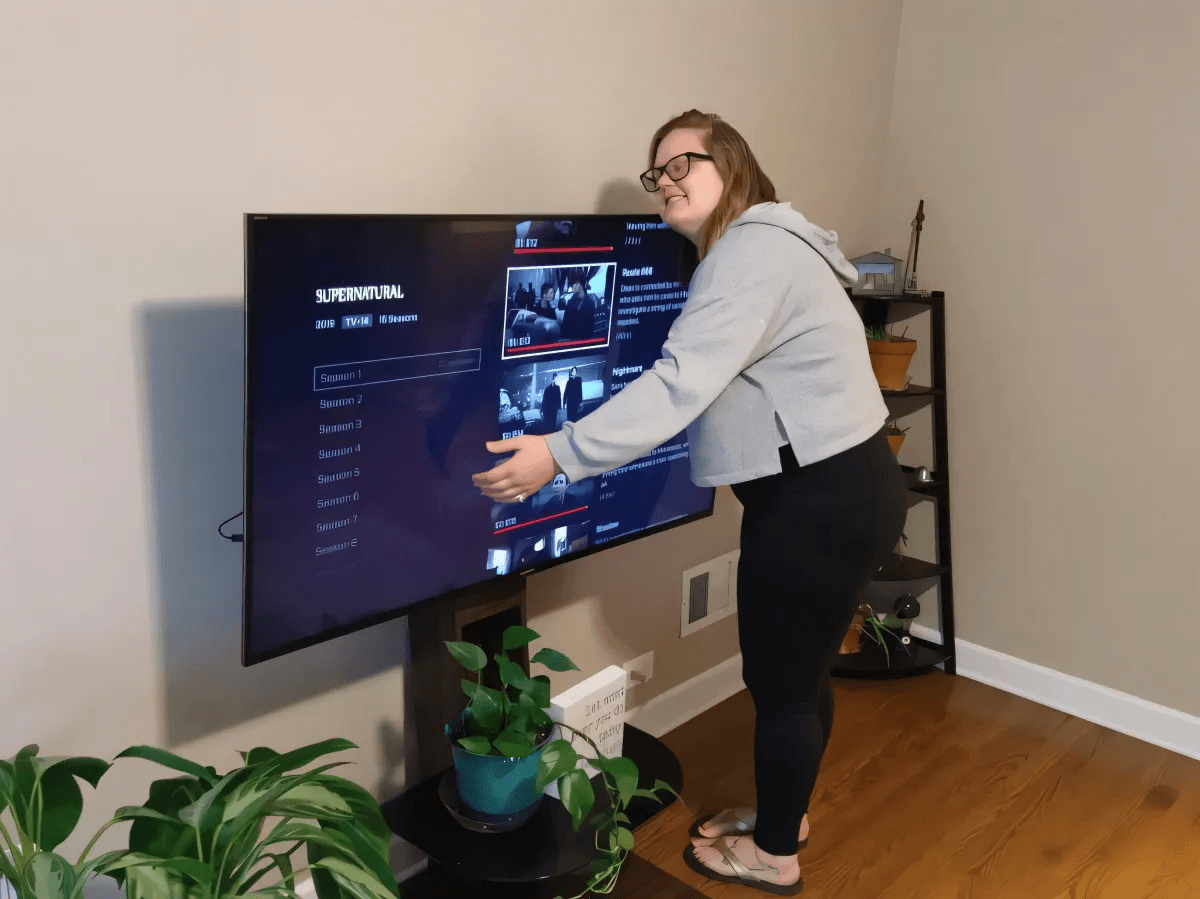TV Addiction: The Reality Of Watching Too Much TV And How To Overcome It

We live in a time when we consume content constantly and with the number of devices out there, the opportunities for this are endless. While there is no shortage of medium through which this content is delivered, there is none as enthralling as the TV binge.
Some people may plan a day to decompress by knocking out a season of the latest Netflix hit or catching up on half a season of one of their regular programs. No harm, no foul, this is what they have planned for, and they go on with their regular lives once they’ve finished.
Then there are some of us who make a few to several hours of TV each day part of the norm, binging season after season, series after series, with no end in sight. Despite the fact that time is passing around us and life continues happening, we remain parked in front of the TV while neglecting more fruitful pursuits. We remain captivated by the story that is playing out in front of us, lost in a fantasy rather than living in the real world.
I’m on the heels of a 3-series TV bender and I feel exhausted. The series of choice in this debacle was The Vampire Diaries, New Girl, and The Americans. They all offered something different and even though I started each with the best of intentions, I’ve finished all three in roughly two months. The saddest part is that it isn’t even the first time I’ve watched New Girl, and it’s not the second either. And this was all while keeping up with my regularly scheduled network television series too. There are about 15 of those.
This harrowing reality of the last two months has brought my priorities, really my lack of priorities, into sharper focus. I know I am not alone.
TV binging has roots in other addictive behaviors.
While television addiction isn’t a formally recognized condition, watching too much television has similarities with other disorders we are familiar with. I spent some time flipping through the Diagnostic and Statistical Manual of Mental Disorders and here are some parallels I found:
- Binge-Eating: a feeling that one cannot stop or control what or how much one is consuming
- Alcohol/Stimulant Use Disorders: a persistent desire or unsuccessful efforts to cut down or control use, recurrent use resulting in failure to fulfill major role obligations, and giving up or reducing other activities because of use
I do not point this out to minimize what anybody who suffers from these disorders is going through or to draw inappropriate comparisons to those conditions that are traditionally very serious with something that hasn’t gained any traction as a recognizable condition, but rather to bring perspective to those who do not find the draw of endless TV watching appealing. As a person who has also done a fair amount of binge-eating and participated in some hefty alcohol abuse, too much TV seems like a natural fit with other disorders that involve over-consumption, and it warrants being looked at more seriously.
Addicts experience their actions as stemming from compulsion rather than choice.
-The Complete Family Guide To Addiction
Think about it, when watching a show via streaming service, the next episode in the series typically loads automatically, the choice here would be to exit out of the app and stop watching. How many times have you said “just one more” only for that one to end and you remain entranced as the next episode begins to play? Then it’s “just one more” again and this can go on for hours. Before you know it, you’ve got a couple of hours to sleep before work, school, or whatever other responsibility you have the next day.
Addiction is marked by the struggle for control.
-Thinking Simply About Addiction
Here’s an example from just this week. With a trip coming up this weekend and a list of things to accomplish this past Sunday, I felt a break was warranted after I checked one item off. Two episodes of Fear the Walking Dead and a two-hour movie later, nothing else had been accomplished. This isn’t the first time something like that has happened either. I cannot even count the number of times I have sat watching TV and in my mind, I am telling myself to just shut it off and get on with the other things that need to be done. I’ve thought about the future regrets especially since I’ve had them before, and yet I do not budge.
There is something sad about being consciously aware of not wanting to do something, but doing it anyway. You start to wonder if other areas of your life may be lacking by searching for a sense of fulfillment from reality not your own. It starts to affect your relationships, your mood, and your well-being.
The effects of Television on your Health.
Screen time. We can’t hear enough about it these days. Phones, tablets, computers, TVs. We’re staring into the bright abyss pretty much constantly. We wake up and check our phones, we work on computers all day, and at the end of the night, we relax in front of the TV.
1. Binge-watching a show releases dopamine in your brain.
The list of things that can cause dopamine to be released in the brain could go on forever – running, dogs, drugs, alcohol, crafting, eating, and even hugs. Dopamine stimulants span a vast spectrum and television is one of those things that gives us the quick release of the feel-good hormones we crave as humans.
Dopamine is directly related to how we feel pleasure and television is an easy way to keep a steady supply flowing. As we continue to watch, we remain feeling good. Once we turn the TV off, we can be left feeling a bit drained as we start coming down from that high.
2. Re-watching the same shows can be a symptom of anxiety.
We’re drawn into storylines because our brain processes them as if we are actually living them. We laugh, we cry, we feel the angst and heartbreak. We even get mad when something happens that we don’t like. With the autoload feature counting down the seconds till the next episode starts we don’t even have to decide if we’re going to continue watching. The streaming platform does it for us, almost like living in the moment.
According to Pamela Rutledge, Media Psychologist, when we are familiar with a show we develop a sense of relationship with the characters so they end up feeling like friends. Especially during the pandemic when we were all craving time with friends and anxiety was sky high, this was a substitute for that in-person experience. Re-watching something we’ve seen before provides comfort for our anxiety because it doesn’t take a lot of energy or overwork our brains following an unknown plot thus allowing for an escape.
The thing about re-watching shows is you know exactly what is going to happen especially if you are feeling a lack of control over your own life. We have no way of knowing what will happen tomorrow because even the best of plans sometimes get off track. Choices that seem right in the moment can end up being wrong the next day. There is comfort in focusing on something that will have no surprises and plays out exactly as we expect it to. Life is unpredictable, a re-watched TV show is not.
3. Watching too much TV too often can be a sign of depression.
If you’re watching TV to help yourself feel better or to get lost in the fantasy of the tale playing out in front of you, it could be a sign of depression.
- Do you feel guilty or have regrets after watching too much TV?
- Did you neglect other responsibilities?
- Is TV your way to dissociate from reality?
- Are you feeling empty now that your most recent TV bender is over?
Using TV as a way to escape from reality is a sign that something may be lacking in your day-to-day life. We get caught up in the fantastical world right in front of us because the mundane goings-on in the real world around us are insufficient. Feelings of loneliness and/or inadequacy can occur and they contribute to depression too.
Loneliness can be the reason you are binge-watching or the cause of it. Too much TV may be isolating you, but if you were already feeling that way prior to binging then it’s likely a coping mechanism.
As for feelings of inadequacy, comparing yourself to fictional characters can and will make you feel like you don’t stack up. Of course, you don’t! These people aren’t real! Their lives have been crafted under ideal circumstances for the story that is being told.
4. Spending too much time in front of the TV can affect you physically.
Spending days on end parked in front of a TV leads to a sedentary lifestyle, especially because most of us spend our working hours sitting at a desk. TV time is also a prime time to snack, often without realizing how much is being eaten. This combo leads to poor posture and obesity among other things.
Sleep can be affected by television. Since most TV viewing happens at night and we are so engaged with the characters we are watching on TV, we often head to bed worked up about what we just saw. Our brains have been overstimulated by the content so we end up restless. According to WebMD, missing out on sleep can cause us to have accidents, lead to heart problems and high blood pressure, kill our sex drive, and cause weight gain.
Combine the seated lifestyle and lack of rest and you’ve got a recipe for disaster. There are a lot of health problems that overlap between the two and one big whammies that might wake you up – if you experience too much of either or both for too long, all those issues start to compound and it can actually lead to death.

Steps you can take to overcome your addiction to television
There is no one size fits all approach to anything in this life. I’ve tried some of these tips in an effort to cut down on TV and the ones I haven’t tried yet are on the list in my war against watching too much TV.
1. Admit to yourself – and someone else if you have to – that you are watching too much TV. You likely already know this, but acknowledgment is the first step to starting to take away its power.
2. Recognize that streaming platforms are enabling your behavior. Whole seasons drop at once and the next episode loads automatically, a combo designed for binging. Limit yourself to a few episodes at a time and stop watching mid-episode to avoid the auto-load after a cliffhanger.
3. Set actual time limits for TV watching and stick to them. You can set a sleep timer on your television for any time of day. Set the timer when you sit down to start watching and when it shuts off, that’s it, you’re done.
4. Examine why you are watching so much TV. Is something lacking in your life, are you avoiding something uncomfortable, or are you hardcore procrastinating? Determine the root of the desire to binge by uncovering the deeper issues.
5. Make a list of all the services you are currently watching on – Here, I’ll help get you started: Hulu, Netflix, Disney+, Prime Video, HBO Max, all the streaming platforms for individual networks, live TV itself, plus anything I missed – and eliminate a few. I’m sure just the thought of this is already causing panic, how will you keep up with a show if you miss the next new episode or season? Revert to #4 and remind yourself of why that is.
6. Don’t start any more new shows!!! Promos are meant to suck you in and keep you hooked, social media tells us what’s trending, and all our friends might be talking about something. I resisted This Is Us and A Million Little Things despite a friend’s best effort to get me to watch them – this was when I had already committed to not watching any new network TV shows which were working well till Rebel came out – I’m sad, but relieved it got canceled after just one season.
7. Get out of your house. You can’t sit in front of the TV if you’re out taking a walk, doing some outdoor activity, or meeting up with friends. Sure, you can stream on a mobile device while out, and if that’s what it takes to get you off the couch initially, then do it, but with the goal in mind that eventually you will put the device down and engage in the present, the real moment you are living in.
8. Face the harsh reality of what you are missing out on. If all you’re doing with your free time is watching TV, there has to be a growing list of things that aren’t getting done – these can be day-to-day responsibilities or new, fun things you want to try. Imagine your future self. What does he/she/them look like if you don’t get out from in front of the thing affectionately referred to as the idiot box?
9. Find a new hobby. There has to be something you’ve always wanted to try. Instead of spending your time watching fictional characters live their best lives, make a plan to put your dream into action. Commit to starting with a few hours a week away from the TV and dedicated to the new hobby – consider it a reward for starting to break your bad habit.
10. Get Active. Whether it’s at the gym, a jog through your neighborhood, or a walk in the park, start doing physical activity. You’ve already done a disservice to your body by spending countless hours on your rear starting in the abyss. Start trying to undo some of that damage immediately.
Remember, you are a work in progress, and we all slip into old habits from time to time. Television is a good way to decompress after a rough day or week, but make sure when you do set aside time for it that you don’t let that turn into weeks or months-long benders of the season after season, show after show.
I don’t need someone to tell me what I already know deep down – I am addicted to TV. I love it. My regular weekly schedule revolves around Chicago Wednesdays and TGIT. The best thing I can say is at least I no longer have to make it home by a certain time to watch shows live. The advent of the DVR has seemed like a lifesaver. I grew up in a time where you couldn’t record TV shows with the click of a few buttons. Back in the day, my dad actually had to pop in a VHS and do it for me on the days I wouldn’t make it home in time. I guess he was my original DVR - Dad Video Recorder ????. I wish I knew then how that was enabling my current reality.
But hey, at least I can admit it, the first step to overcoming the problem is admitting you have one in the first place. I think I’ll go take a walk now.

Opinions and Perspectives
This whole article feels like a personal callout and I'm not sure how to feel about it.
The comfort of predictability in rewatching shows makes perfect sense. Life is so unpredictable right now.
Never thought about how auto-play removes our active choice to keep watching. That's pretty insidious.
The health impacts are scary. I need to start moving more between episodes at least.
I find it interesting how streaming has changed our viewing habits compared to traditional TV.
This article motivated me to cancel some of my streaming subscriptions. Baby steps!
Getting out of the house is key. I started taking evening walks instead of immediate TV time after work.
I think pandemic binge watching created some bad habits that are hard to break now.
The isolation aspect is real. I've definitely lost touch with friends because I preferred staying in to watch shows.
The suggestion to admit the problem to someone else is tough but necessary. I just told my sister about my TV habits.
I appreciate how the article addresses this as a real issue without being overly dramatic about it.
The part about comparing ourselves to fictional characters is spot on. Their lives are literally scripted to be interesting.
I've started using TV as a reward after completing tasks instead of my default activity.
The anxiety connection is fascinating. I definitely use familiar shows as comfort when I'm stressed.
We need to stop shaming people for their entertainment choices. Some people read books, some watch TV.
The physical activity suggestions are good, but I've started doing workout videos on TV instead.
Anyone else feel personally called out by the list of streaming services? I have way too many subscriptions.
I tried the mid-episode stopping technique. It actually works better than ending at a cliffhanger.
The Dad Video Recorder joke made me smile. But seriously, TV watching was so different before streaming.
I appreciate how the article acknowledges that some TV watching is okay. We don't need to completely eliminate it.
Watching TV while scrolling on my phone is my worst habit. Double the screen time!
The sleep issues are real. I always regret late-night binging the next morning at work.
I notice I snack way more when watching TV. It's like my hand automatically reaches for food.
The suggestion about finding new hobbies is great. I've started painting and it's so much more fulfilling than mindless watching.
My partner and I actually scheduled TV-free evenings. It was hard at first but now we look forward to them.
Setting actual time limits seems impossible. Once I start watching, I lose all sense of time.
The part about missing out on life really hit me. I've definitely chosen TV over social events before.
I'm guilty of using TV to procrastinate. It's so easy to say I'll just watch one episode before starting work.
Sometimes I feel like I know TV characters better than my real friends. That can't be healthy.
The auto-play feature is my downfall. I need to start being more mindful about actively choosing to continue watching.
I find it interesting how the article connects anxiety to rewatching shows. I definitely do this when I'm stressed.
The comparison to early TV recording methods made me laugh. Remember programming VCRs? That effort alone limited viewing.
Actually, I've started knitting while watching TV. At least I'm creating something while I binge!
Not starting new shows is the hardest part for me. Everyone's always talking about must-watch series.
The suggestion to cut streaming services is good in theory but so hard in practice. I get anxiety just thinking about it.
The part about knowing exactly what happens in rewatched shows really struck a chord with me. It's absolutely a control thing.
I disagree that we need to feel guilty about watching TV. Our ancestors didn't have this luxury, why shouldn't we enjoy it?
The physical health effects really hit home. My posture has gotten terrible from all the couch time.
I use TV as background noise while I work. Does that count as addiction or is it different?
Let's be real though - streaming platforms are designed to keep us watching. The auto-play feature is basically evil genius level manipulation.
Just reading this made me want to go outside for a walk. I've been sitting here watching shows all weekend.
As someone who works in mental health, I appreciate how the article addresses the connection between excessive TV watching and depression without being judgmental.
This resonates with me. I often find myself saying just one more episode and suddenly its 3am.
The dopamine release explanation makes so much sense. I definitely get that post-binge emptiness when I finish a series I was really into.
I think the article is a bit dramatic. There's nothing wrong with enjoying television as long as you're still handling your responsibilities.
Anyone else feel personally attacked by the part about re-watching the same shows? I must have seen The Office at least 5 times through!
The comparison to other addictive behaviors really opened my eyes. I never thought about how similar the patterns are to things like binge eating.
I really relate to this article. I've found myself stuck in endless TV binges, especially during the pandemic. It's scary how much time just slips away.
